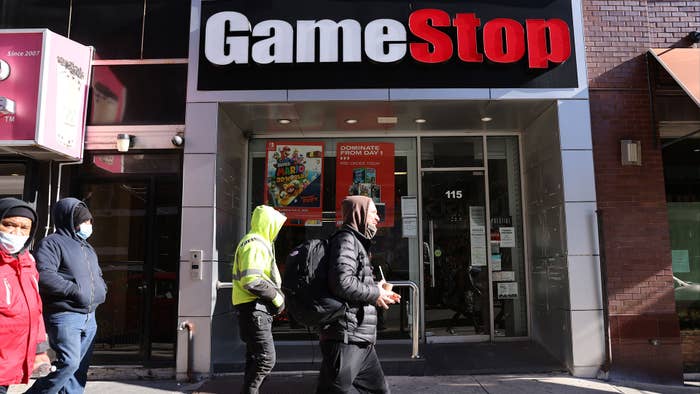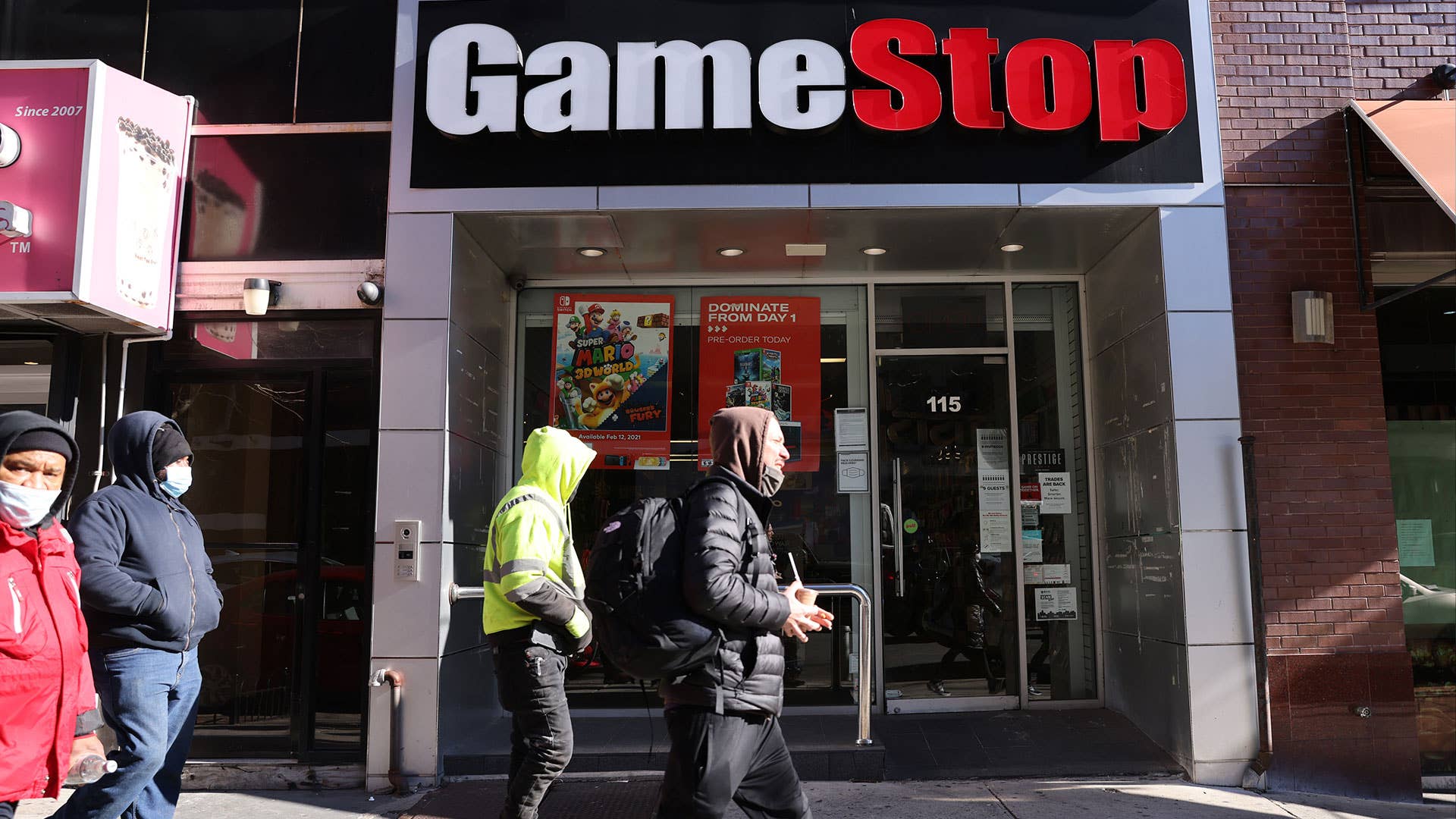
It’s been a wild week for Wall Street and Bay Street.
A subgroup of Redditors, /wallstreetbets, recently managed to band together to create an unprecedented short squeeze, sending the price of American video game retailer GameStop skyrocketing and punishing overzealous hedge funds looking for an easy buck.
The event sent a ripple of volatility through the financial world, including Canada, as institutions struggled to accurately reprice securities, particularly short sales. Here’s what happened:
Late last year, Ryan Cohen (founder of online pet retailer Chewy) began acquiring shares in distressed game retailer GameStop, which had been widely written off as a Blockbuster-esque dinosaur bound for extinction. This was somewhat justified as sales were dropping, stores were closing and the share price was cratering, but Cohen valued it for its rich cash reserve, brand recognition, and the enormous short position betting against the company. As a matter of fact, it was so pre-determined that GameStop would fail there was actually over a 140 percent short interest. The legality of this is a topic of hot debate at the moment, but basically more than 100 percent of the company shares had actually been borrowed and bet against. This set the scene for what would become a historic short squeeze.
Fast-forward to late January 22, 2021 and GameStop shares were up to US$76 from US$15 back in December. But that over-400 percent leap would be nothing compared to what happened mid-week after Andrew Left, author and editor of the online newsletter Citron Research, tweeted his intention to release his list of “5 reasons to short GameStop” the following day. After temporarily halting GameStop’s rally—and delaying the next day due to the inauguration (planned over 200 years ago), and the following day due to being "hacked”—Left eventually released a terribly-received video that caused the pressure of the stock to release and triggered a 69 percent rally, momentarily halting trading on exchanges around the world.
The explosive action caused New York-based hedge fund and GameStop’s main financial adversary Melvin Capital's short bets to sour so badly it announced it required a US$2.75 billion bailout. It was later noted that Citron Research, which held a similar position, covered its short at US$90 due to "unprecedented" events.
This news of the pain shorts were experiencing and the funds’ seemingly endless supply of capital caused a frenzy on Reddit and across social media, and the stock price surged even further in defiance to US$159.18.
Then on Monday, Reddit founder Alexis Ohanian tweeted at the infamous venture capitalist and early Facebook investor Chamath Palihapitiya, telling him to buy GameStop, and he obliged. If this was the fuel, then Elon Musk’s after-market tweet on Tuesday including the word "Gamestonk!!" and a direct link to /wallstreetbets was the spark.
This brought global attention and more importantly Elon's army of fanboys, all recently rich from the enormously profitable short squeeze that Tesla's stock had enjoyed. The resulting buying was enough to drive GameStop to a mind-blowing US$504.98 on Thursday morning pre-market trading.
(BTW, in case anyone's curious, there is a Canadian version of r/wallstreetbets, and it's called r/baystreetbets.)
In reaction, millennial investing platform Robinhood halted purchasing of GameStop and other short-squeezed stocks, suggesting a deep irony within their public mission to “democratize finance for all.” Robinhood's halt in purchases is likely due to their close financial proximity to Citadel Capital, which funds the aforementioned Melvin Capital and provides a "material" amount of Robinhood’s revenue.
The Robinood trading ban, combined with a swift and orchestrated short attack, caused the GameStop stock to implode to a low of US$112.25 as it became apparent that other brokerages were also preventing their customers from buying GameStop and other highly shorted stocks.
In Canada, the volatility and flood of self-directed investors logging into their brokerages resulted in some shortages and drops of service across providers. RBC reported that its online banking portal, RBC Direct Investing, crashed briefly on Wednesday morning. And TD Canada Trust also tweeted that it had temporarily experienced outages and was getting a spike in calls to the investing help line, which led to the dreaded longer-than-normal call volume message and long wait times for customers.
On Thursday, TD disclosed that it had increased restrictions for short selling and uncovered options of GameStop, Express Inc. and AMC Entertainment Holdings Inc. on the New York Stock Exchange.
"In the interests of our clients and the bank, we are actively monitoring the ongoing market activity and have put into place precautionary measures to restrict short selling and options trading for some securities, like several brokerages and trading platforms across North America," a TD spokesman told the Canadian Press.
"In recent days, we have seen daily trade volumes increase substantially. This was largely driven by the stocks we are seeing in the news, accounting for roughly half of the volume increase. We're also seeing a lift in trading activity via mobile, and while younger demographics are contributing to some of the increased volume, we're seeing higher activity across the board."
A tweet from Wealthsimple said the Canadian app was seeing lags in email notifications due to extremely high volumes. The Toronto-based robo-advisor app said it was not restricting trades on any securities, but that some orders may show up pending or cancelled because protections are activated every time a price changes more than 5 per cent.
Meanwhile, trading in BlackBerry shares dropped by 40.3 percent on Thursday—after rocketing to a nine-year high of $31.49 per share earlier this week thanks to investment message boards pouring money into the Canadian company as a result of the GameStop trend. Blackberry has been one of the stocks frequently discussed on r/wallstreetbets. At the time of writing, it was trading at $17.37 per share.
Investing forum TradingView says its website saw a 514 percent increase in Canadian visitors to its BlackBerry stock page over the last three days, and a 1,500 percent increase in Canadians clicking on its GameStop stock page, according to the Canadian Press.
What a time. Some on social media are suggesting that the aforementioned extreme bailouts could mean the end of Melvin and/or Citron, but a spokesperson for Melvin told US News that “the social media posts about Melvin Capital going bankrupt are categorically false.”
Time, and maybe Reddit, will ultimately tell.

